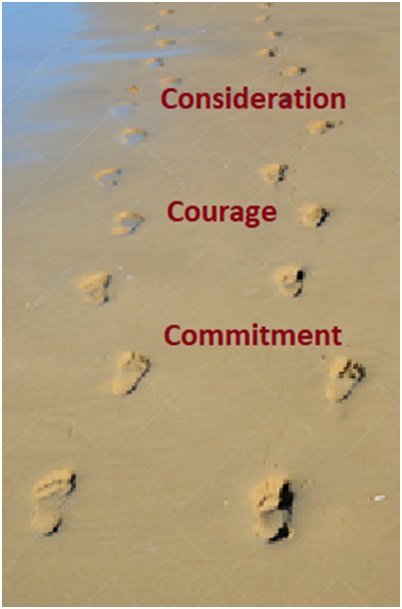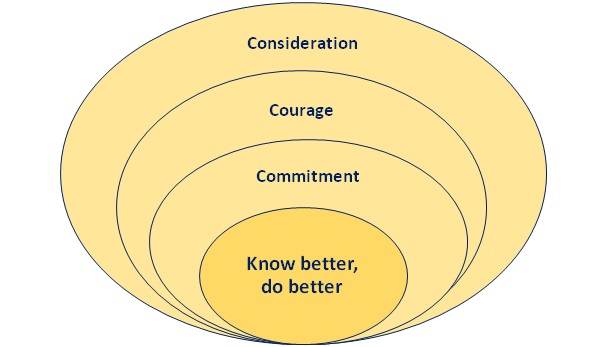A Coaching Model Created by Jane Hayman
(Leadership Coach, AUSTRALIA)
Introduction

The name of my coaching model is Consideration, Courage, Commitment.
These three nouns embody the essence of the coaching journey and what we are asking both the coach and the person being coached-the coachee- to bring to the process.
Underlying my approach to coaching is a quotation from Maya Angelou.
Do the best you can until you know better. Then when you know better, do better.
This quotation resonates with me at a number of levels. The concept of knowing better is important because it encapsulates the idea of learning and growing. It is not about the more narrow acquisition of knowledge, information or facts, but about deep internalised insights and understanding that can only come about through honest and brave work.
Know better means to develop awareness. Awareness of what you bring, your strengths, potential and what your part has been in any situation. Awareness without judgement and with compassion. Awareness of your impact on others and how it may differ from your intentions.
The quote assumes that the person being coached wants to do better according to their own values. No-one sets out with the desire to fail or be the problem child at work.
This assumption positions the person being coached as a free agent, wishing to develop, transform or improve in some way. It assumes the best intentions of the coachee. This trust in the coachee and belief that they have the keys to their own development is a fundamental premise of coaching. Who defines what it is to do better? The parameters of better are mapped out by the coachee, through the skilful support of the coach.
The coach walks alongside the client on this journey; hence my choice of the visual with the side of the footprint by side. The coach is guiding, not leading.
The coach does not impose their version of what better means or their own agenda. Rather the coach’s role is to hold the space for the coachee to identify what better means to them and to support the coachee to learn what they need to move forward. The coaching is embedded in trust of the coachee’s own intentions.
My coaching clients are senior leaders in corporate and government worlds, often dealing with significant change. This model is designed to support people who are focused and accountable and want to feel a real shift in what they do. A secondary outcome of the coaching model is to demonstrate to these leaders the power of using questions to shift thinking in their own reports and to consider if a more coaching style of leadership will serve them.

Explanation
The kernel of the approach for growth and transformation, know better, do better is surrounded by three important concepts.
Consideration
Courage
Commitment
These concepts form the backbone of the coaching process and keep the coaching conversation intentional. There is forward momentum – loosely the starting point is a consideration or the building of awareness, the next stage is exploring the coachee’s courage and the final stage is inviting commitment.
However, the process of using this model is not a rigid or linear progression through the three concepts. It is possible and indeed often preferable to circle back when required. A discussion about commitment may lead to questions nudging towards further consideration or reframing of an issue. The most important part of the model is that the coach holds awareness of the particular stage the conversation is in and is prepared to stay there, move back or move forward depending on the client’s need.
This model is about looking at what has been and what can be, using self-reflection and shifting of frameworks. It is about not judging, but about staying beside the coachee and supporting them to do the work they need to do to make progress.
Consideration
Consideration means the coach’s consideration of the client as a whole person with the solutions. It also contains the coach’s consideration of the need for confidentiality and the trust between the coach and client.
More importantly, it includes the client’s full honest consideration of their situation and what they are bringing to it. It covers the establishment of the Coaching Agreement and the exploration of the coachee’s reality. It enables the real issue to be identified and framed and the coachee to recognise the assumptions they are making and the impact of those assumptions.
The Consideration dimension includes openness and a lack of fixed agenda from the coach. It is an encouragement to the coachee to look at what they really want and what the context is. Consideration is about being open to learning and to shift thinking.
Courage
Courage is about the client moving deeper. Change or shift is not easy. Courage is required to be more open and to do the difficult work. Courage is required to let go of pre-conceptions. The coach’s role is not to push the coachee, but to open doors and see if they wish to enter with guidance and support. Through powerful questioning, the coach will enable a reframing or recognition of patterns of behaviour.
In order for the coachee to demonstrate courage, there needs to be genuine trust and openness between the coach and coachee. The coachee needs to feel safe and that they are setting the agenda. The coach’s openness, transparency and lack of negative judgement will enable the coachee to step into a challenging space without feeling pulled or pushed there.
Courage is about facing the losses or gains associated with change. Courage is about being vulnerable and accepting ambiguity.
Commitment
This aspect of the coaching process is where the coachee is challenged to answer the question, ‘so what, now what?’. Having undertaken consideration and explored with courage, what are they going to commit to doing? This phase of coaching is client-led. It enables the coachee to identify the way forward and to position themselves for accountability. The coachee will outline the measures of their own success and commit to the first step as part of the overall shift they are seeking.
In a series of coaching conversations, the commitments in the first conversation will be picked up for consideration in the subsequent coaching encounter. While circling back as required forward progress will be made.
Consideration, Courage and Commitment provide the stepping stones in the coaching journey. They are not a formula but a gentle road map to ensure that each phase is relevant and valuable.
Reference
A quote by Maya Angelou theysaidso.com,2020. Apr 10, 2020. https://theysaidso.com/quote/maya-angelou-do-the-best-you-can-until-you-know-better-then-when-you-know-better/do-better.